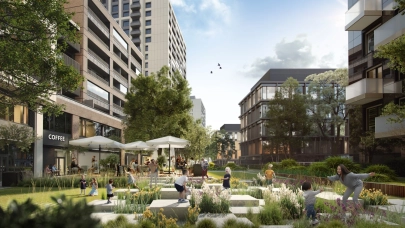
Speakers at 2021 Property Investment Outlook 2021, an online event organised by Property Forum, have indicated unbroken market optimism. From living investments through the retail market to the office segment, participants in panel discussions expected positive changes and further growth in the CEE property market.
Join us for our next online event on 25 March where leading bankers and financial directors will discuss financing strategies for the second pandemic year.
The event’s keynote speaker, Zoltán Szelyes (CEO, Macro Real Estate AG), presented an outlook for the European real estate investment market. Summarising 2020, he spoke about the crisis due to the coronavirus, the emergence of online sales in the retail market and the resulting increased demand for logistics properties, and about how high-quality residential properties in good locations are increasingly differentiated through pricing. In the CEE region as a whole, rental fees for new logistics property increased last year, while the office market saw a slight decrease of a few percentage points last year.
According to Szelyes, the outlook is positive and a swift rebound in GDP is to be expected, accompanied by a similar rebound in the investment volume that he suggests will be driven by cross-border demand after the continent reopens. He said vacancy rates in the office market could continue to increase for some time yet, while logistics properties could remain attractive targets for investors thanks to high yields.
How will investors act?
In the panel on investment strategies, Mihai Patrulescu (Head of Investment Properties, CBRE Romania) said he expected major movements in capital invested both between various segments and between geographical areas. As for the retail market, retail parks have gained popularity during the pandemic are likely to continue prospering. Patrulescu mentioned data centres as a new and exciting asset class in the property market. Speaking about investment strategies, Paul Hallam (Managing Partner, GalCap Europe) said the hotel sector was currently outside of his company's search zone, and there were also not too many assets on the retail market in which they would invest.
2020 was not a wasted year for the logistics sector but rather a perfect one, Hadley Dean (Founder, MDC²) said. In addition to a spike in e-commerce, demand for logistics properties was also strong because businesses stockpiled inventory to protect against supply outages, he said. As for the expected impact of e-commerce on the logistics sector, Dean estimated that each percentage point of difference between online and offline retail translates to demand for 6 million sqm of warehouse space in Europe.
According to Adrian Karczewicz (Head of Divestments CEE, Skanska Commercial Development Europe), it is worth continuing office market developments as although investors are more cautious, there is still huge demand from tenants for buildings with community spaces and those suited to co-working. As a result, these considerations play a key role in all office buildings currently under development. In the office market, properties are expected to fare according to quality as modern offices in good locations should stagnate while those in Classes B and C can brace for a major blow, Karczewicz said.
Regarding future expectations, Victor Constantinescu (Managing Partner, Romania & Co-Head of Real Estate, Kinstellar) expressed optimism and expected higher investment volumes than earlier in the European real estate market.
Hedwig Höfler (Head of Investment Management, CA Immo) said the office rental market would go on but at a different level. Most tenants are now hesitant and are postponing decisions as long as they can. Location and the flexibility of buildings now matter much more than previously, she said, adding that office buildings of poorer quality will also fall behind due to environmental considerations. Speaking about data centres, Höfler concurred that these were considered valuable assets while pointing out that the biggest players, such as Amazon, have their own centres.
Join us for our next online event on 25 March where leading bankers and financial directors will discuss financing strategies for the second pandemic year.
Online education and university students moving home – Is their potential left in student housing?
Living assets were also on the agenda of the conference, with a particular focus on the future of rental apartments and private dormitories. Moderator Przemyslaw Chimczak-Bratkowski (CEO & Co-Founder, ThinkCo - real estate research lab) raised the topic at the panel. As Pepijn Morshuis (CEO, Trei Real Estate) highlighted, younger generations do not necessarily wish to own the homes they live in as they want to remain flexible. Regardless of country, housing will always remain a priority issue, so it is hard to envision a scenario when the residential sector would not do well, unlike offices or hotels.
Roee Shamir (Managing Director, Aurec Capital Poland) said that after the recent hard period, it was now evident that residential properties were stable assets, which in his view foreshadowed even better results in the future. Although university students are currently learning online, homes are receiving even more attention during home office. The main benefit of rental apartments is flexibility, he said, adding that if tenants change their minds, they can move to bigger properties quickly and will not be 'stuck' as owners are. According to Marek Obuchowicz (Partner, Griffin Real Estate), private dormitories will continue to exist as it is very important for university students to be in a community. Harald Hübl (Investment Director, value one holding AG) also saw no cause for concern regarding the sector, adding that those building premium apartments in Austria had especially no reason for complaints. Regarding changes, he highlighted that balconies were now an essential feature of new residential buildings as people were looking to experience as much nature as possible.




